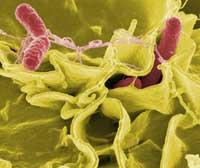Dear bacteria, so close and almost without us
The moment of birth and the first year of life are fundamental in the life of a child in many ways. In its relationship with bacteria it is also fundamental this time, since the child begins to receive bacteria from the very moment of childbirth, as has been said, and for one year has bacterial colonies similar to those of an adult.

One of the bacteria that are given in everyone's mouth in summer is Salmonella, the bacterium responsible for salmonellosis. (Photo: NIAID, NIH)
To see how the bacterial colonies of children evolve, they study the feces, which are the most abundant bacteria in the digestive system and especially in the intestine. In a recently published study, for example, the feces of fourteen children were analyzed since they were born until they were one year old, and they were compared with the bacteria of each mother: vaginal, fecal, cutaneous... In this way, the main bacterial source of the child was analyzed.
The child collects most of his mother's bacteria. During pregnancy, the child is in a sterile environment, the uterus. But when childbirth begins to receive bacteria, especially from the mother. The first contact is made with vaginal bacteria of the mother, which adhere to the skin and even swallow out of the mother's body; and, once out, she receives those who are in the air, those of the mother's skin, those of the breast milk, etc., and not only those of the mother, among others, those who the child approaches in an acaricious way. Thus, in a short time the bacteria have colonized the new body.
Abundant intestinal flora

These colonies of bacteria will constitute a protective barrier against other bacteria and microorganisms. Somehow, they will not leave room for other bacteria. Imagine that only in the intestine everyone has 1,2 kilograms of bacteria. The intestinal flora is, therefore, very abundant.
Intestinal flora contributes to various vital functions: it helps to digestion of some vegetable sugars, produces some vitamins (such as vitamin K) and promotes the immune system. Therefore, intestinal bacteria are essential to live.
These bacteria have evolved with man, they are adapted to live in the human body (mainly in the skin and intestine). The best known are lactobacilli and bifidobacterias, but there are many more: there are more than a thousand species of bacteria living in close relationship with man. Yes, it is considered that each individual has about one hundred species, so each one has its own combination of bacteria and does not have to be the same as that of the side.

Bacteria are like the fingerprints of each of us. And they live in close relationship with us. Unfortunately, despite its importance for life, so far little attention has been paid to bacteria that do not cause disease. However, it seems that this is about to change, as research related to bacteria increases.
Published in 7K.
Buletina
Bidali zure helbide elektronikoa eta jaso asteroko buletina zure sarrera-ontzian











